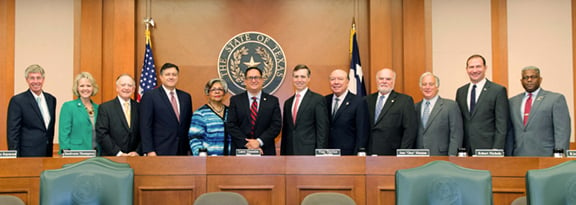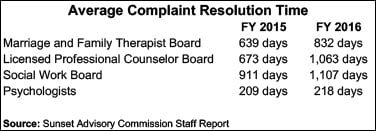Sunset Review
Boards of Examiners Ripped for Backlogs
Boards of Examiners Ripped for Backlogs
Sunset Review rough for boards that license and regulate
professionals who play key roles in child-custody cases
by Ken Martin
© The Austin Bulldog 2016
Part 6 in a Series
Posted Friday December 16, 2016 10:39am
The Austin Bulldog’s investigation of problems in family law courts involving child-custody cases includes a review of complaints against some of the professionals appointed by courts to provide related services. Specific complaints will be detailed in later installments of this ongoing series. An overarching question is why does it take two or three years to resolve complaints against these practitioners? The answer was revealed in the biennial exercise known as Sunset in Texas, which is now underway.
Sunset in Texas is not the romantic experience the name might imply. It’s not a time for kicking back, sipping a beer, and watching the sun dip into the chilly waters of Lake Travis. Sunset in Texas is a time for a deep and probing examination of a good portion of the 130-odd Texas governmental agencies to learn how well they are performing. It’s a time for determining whether the sun should set on their work and deciding if these agencies should fade into history.
Although the Sunset process for the 2016-2017 cycle is scrutinizing 25 separate agencies, this story will focus solely on the four professions whose services are utilized to varying degrees in family law cases involving child custody: Professional Counselors, Psychologists, Social Workers, and Marriage and Family Therapists.
Practitioners in each of these professions are licensed and regulated by a separate Texas State Boards of Examiners. Each of these boards will be abolished unless lawmakers reauthorize them in the 85th Session of the Texas Legislature that convenes January 20.
As with all agencies now under review, if these four are reauthorized they could be radically reformed. They could also be moved under the umbrella of a different state agency.
Three of these Boards of Examiners—for Professional Counselors, Social Workers, and Marriage and Family Therapists, which collectively oversee some 50,000 licensees—currently receive administrative support from the Texas Department of State Health Services (DSHS).
It’s apparent these three boards will not be left to continue floundering as they have been, based on the scathing review of their performance aired during a December 8 hearing of the Sunset Advisory Commission. Under the current operating procedures and with insufficient staff support from DSHS, they have not kept up with the workload. The backlog of unresolved complaints against the professionals they regulate has grown exponentially in recent years.
 During Fiscal Years 2000 through 2006, the average length of time for these three boards to resolve complaints rarely exceeded 200 days. But since FY 2007 the length of time needed to resolve complaints has been rising steadily and now stands at 2.3 years for marriage and family therapists, 2.9 years for professional counselors, and 3 years for social workers.
During Fiscal Years 2000 through 2006, the average length of time for these three boards to resolve complaints rarely exceeded 200 days. But since FY 2007 the length of time needed to resolve complaints has been rising steadily and now stands at 2.3 years for marriage and family therapists, 2.9 years for professional counselors, and 3 years for social workers.
These delays fail to protect the health and safety of Texans—many of whom are struggling with litigation and mental stress. The delays also soil the reputation of practitioners who may have been wrongfully accused of misconduct and would like a timely opportunity to clear their names.
The Sunset Advisory Commission Staff Report recommended that the Board of Examiners of Professional Counselors, Social Workers, and Marriage and Family Therapists all be transferred to the Texas Department of Licensing and Regulation (TDLR) by August 31, 2018.
In addition the staff report recommended that the boards’ complaints and ethics committees be abolished, that board members not be involved in investigating complaints, and that TDLR develops a policy for prioritizing complaints and updates enforcement plans. In addition the report calls for throwing a wider net when checking the backgrounds for licensure applicants to include fingerprints and checks for disciplinary actions taken in other states.
Psychologist examiners board excels







